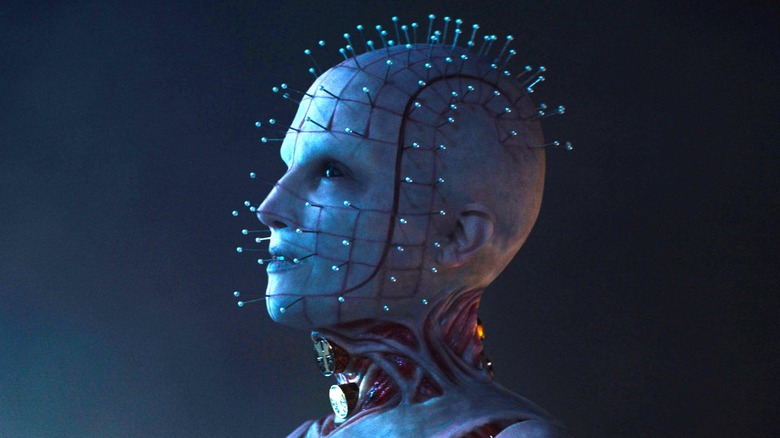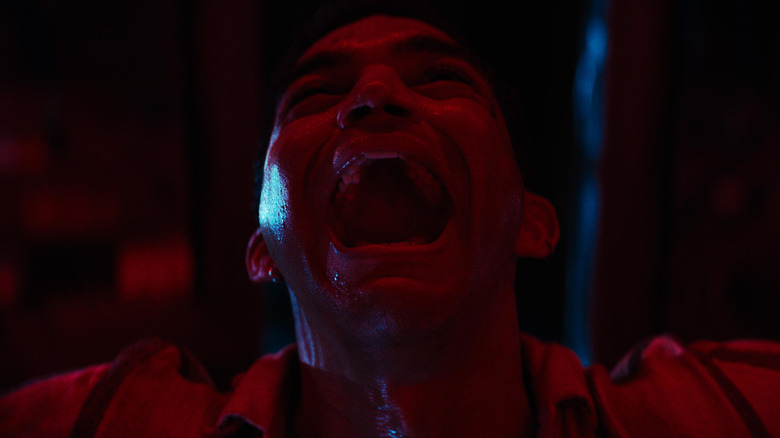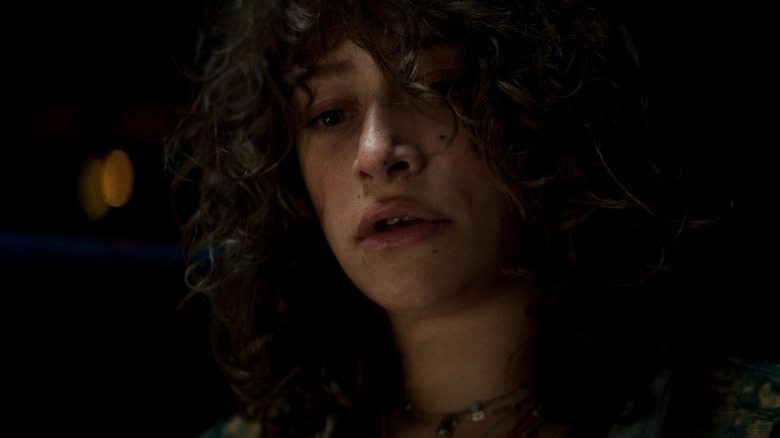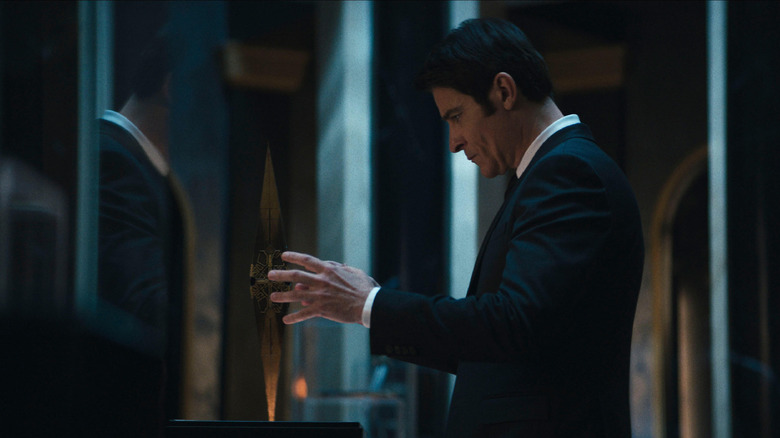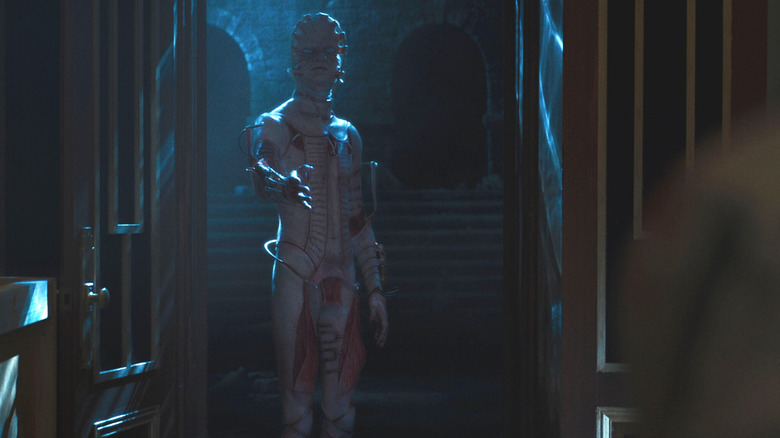Hellraiser Ending Explained: Be Careful What You Wish For
Greater delights, also known as major spoilers for "Hellraiser," await you in this article.
After more than 20 years, the first "Hellraiser" movie to be given a major studio release has finally been unleashed. With most of the franchise being relegated to low-budget direct-to-video schlock, it is a breath of fresh air to see Pinhead and their gash of Cenobites return, even if we would have preferred to see them in theaters instead of on Hulu. However, that's beside the point, because what matters is that they are back in all their horrific glory.
"Hellraiser" does some pretty interesting things with the established lore of the franchise while also feeling like its own thing. Nowhere is this more apparent than the changes made to the franchise's famous box – in David Bruckner's take, solving the box to total completion after five sacrifices will allow the user to be granted a wish. These wishes are categorized under Lament (life), Lore (knowledge), Laliderant (love), Liminal (sensation), Lazarus (resurrection), and finally, Leviathan (power). In the case of Riley (Odessa A'zion), she's hoping to find some important loopholes that will allow her to grant the gift of Lazarus in order to bring back her brother Matt (Brandon Flynn).
It is this expansion of the box that helps set the tone of the entire film, especially its final act, into motion. Without these new additions to the "Hellraiser" lore, the film's compelling allegories for addiction and abuse may not be as effective as they were here.
One important loophole
The unintended sacrifice of the Chatterer (Jason Liles) sets forth a pretty decent idea for Riley. It appears that if she draws blood from a Cenobite using the box, their deaths count towards a new Configuration. This results in her and Trevor's boyfriend Colin (Adam Faison) concocting a new plan — what if they intentionally let the Cenobites into the steel-protected mansion of Mr. Voight (Goran Višnjić) and use them as the final sacrifices to achieve Lazarus? While definitely a crazy idea, it's one that does make a lot of sense given the circumstances.
However, there is a small wrench thrown into this plan, because it turns out that news of Voight's disappearance was greatly exaggerated, and Riley's boyfriend Trevor (Drew Starkey) knew this all along. Remember, he was the same person who convinced Riley to steal the box, and this is revealed in the third act to have been an intentional lure orchestrated by Voight for a paycheck. By sacrificing Riley, the creepy art collector will be able to reverse his previous gift of Liminal, which proved to be a curse after he completed the Configurations six years prior.
Or at least, that's what he thinks, because it turns out that gifts like the ones Cenobites give can't be exchanged for something else. This is precisely what the Hell Priest (Jamie Clayton) tells Voight before the Leviathan comes to collect his body and soul as punishment.
I've seen your gifts
While that's happening, Riley finally has enough of Trevor. When the Cenobite known as the Gasp (Selina Lo) attempts to take Colin after Voight stabbed him with the box, she pleads that he shouldn't be punished because she wasn't the one who marked him. Instead, she marks Trevor, whom the Gasp takes instead, freeing Colin in the process.
However, them walking away from the mess isn't the most important part of the film. That comes when the Hell Priest asks Riley which gift she wants. While this entire ordeal happened because she wanted to resurrect Matt, she realizes that the gifts promised by the Cenobites were curses and that even if Matt was brought back, he wouldn't be the same. As she declines to accept a gift for completing the Configurations, the Hell Priest chastises her for choosing to live a normal life before leaving to help the Leviathan torture Voight for eternity.
You've got to carry that weight
Where do we even begin with that analysis? Let's start with that fateful last-minute decision by Riley to not bring Matt back through Lazarus. As viewers saw throughout the film, the siblings have had a rough relationship due to Riley's drug addiction and Matt's overbearing nature, and that tension was hitting its apex when the latter was unintentionally marked and taken away by the Cenobites. Riley believes that her relapse, which was triggered by a nasty argument between the two of them, inadvertently caused his demise.
In her mind, her need for comfort and the euphoric feeling of being outside of her body outweighed safety, especially since she was already getting bad vibes from the box. The promise of a resurrection for Matt gave her that same feeling, but she ultimately realized that it was masking something much darker.
This was all fueled by the box, which kept sucking in the blood of its victims with the promise of something greater in the future. This isn't unlike how those afflicted by addiction become dependent on their vices under the pretense that they will feel better or achieve something greater than themselves. Voight was addicted to the ideas that the box promised him, and Riley almost was. However, where one dug deeper into his addiction, the other took the actions she needed to take in order to overcome it.
Abuse of power comes as no surprise
Speaking of Voight, his character is a whole other can of worms that needs to be opened. The eccentric art collector was said to have been missing after he was implicated in the disappearances of at least four people, one of whom was the young man named Joey (Kit Clarke) from the film's introduction. Alongside his business partner Serena (Hiam Abbass), he would throw wild parties and lure unsuspecting guests to a room akin to a worship site, making them solve a configuration in order to bring him closer to the Cenobites.
It is hard not to think about Jeffrey Epstein, the billionaire financier who was exposed as a sex trafficker and child abuser in 2019, and we're being generous with that description. Details about the horrific underground world he helped facilitate came to light and were pushed even further into the mainstream upon his mysterious death that same year.
Voight is essentially a stand-in for Epstein, with Serena taking on the Ghislaine Maxwell role as facilitator and accomplice. One can easily say that his secret rooms and sexual deviancy are an example of this, but his craving for dominance is the most telling of all. He doesn't care who has to suffer as long as he can reaffirm his status as a rich and powerful man, looking down upon others who aren't on his level. Luckily for us, he's just another plaything in the eyes of the Leviathan.
What's your pleasure?
There is a lot that you can unpack in the newest "Hellraiser," and this explainer might not even scratch the surface of Bruckner's intentions, given how rich "The Night House" is in subtext. However, what we do find is a story that discusses the horrors of addiction and abuse of power in an effective and entertaining manner.
These horrors arguably would not be possible if the role of the box wasn't expanded for this film. The new Configurations and the final prize they tease help propel the need for the puzzles to be continued, creating a sense of compulsion that quickly turns horrific. That's why Voight kept coming back to the box, even after he initially claimed his "prize." That's why Riley still kept the box despite knowing there was something wrong with it. Its influence doesn't let go of its users until they've been claimed by the Leviathan, and even then, they are still stuck in a constant need of stimulation caused by the box. In many cases, it's tragic. But in others, it's deserved.
"Hellraiser" is now streaming on Hulu.
